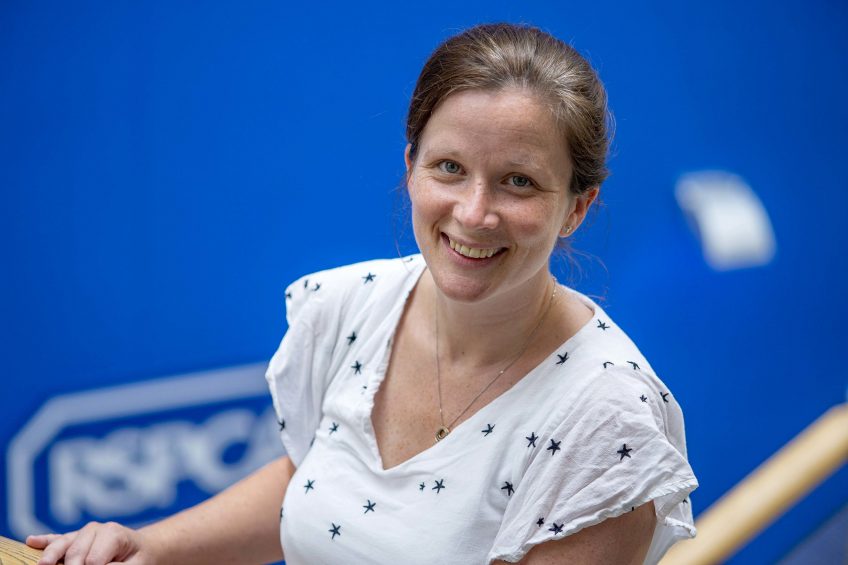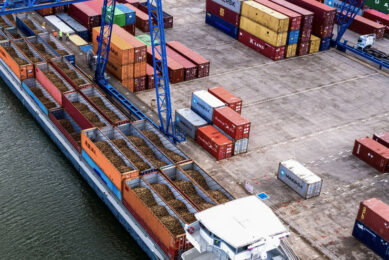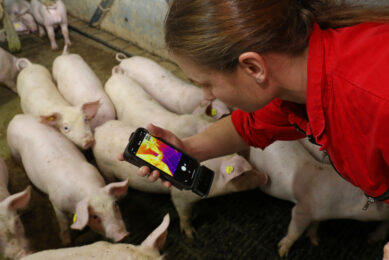RSPCA interview: “Positive solutions are the way forward”

Not all animal welfare organisations are created equal: where some aim to confront, others look to cooperate. The British RSPCA combines its animal welfare goals with an understanding for farmers’ needs. Kate Parkes, senior scientific officer at the RSPCA’s farm animals department: “If it is just one-way criticism, people close themselves off.”
The RSPCA headquarters in Horsham, United Kingdom, is not exactly your average office building. At the entrance, a life size plastic cow greets visitors, covered with signatures of British celebrities who once endorsed an animal welfare goal – former prime minister Tony Blair’s name being prominent on the forehead. Also worth mentioning: the building’s restaurant displays shelves of dog and cat food. And that’s probably related to the fact that employees are allowed to bring their pets to the office, so every now and again, staff leave for a quick break to walk their – well-behaved – dogs.
The British Royal Society for the Prevention of Cruelty to Animals (RSPCA) is probably one of the world’s most well-known animal welfare organisations. Apart from investigating cruelty cases, they also have a focus on livestock. At the Farm Animals Department, Kate Parkes is providing the scientific and technical expertise on pig and broiler welfare. Composing and discussing welfare standards forms a major part of this – the RSPCA Assured programme offers guidelines for swine producers who would like to offer that bit extra to their animals. Ms Parkes’ job also includes consulting and communicating with farmers, the media, several councils and the British ministry of agriculture (Defra). Main characteristics like her being committed, pragmatic and communicative come in very handy for her job.
|
Pig Progress: When you say ‘committed’ – what moments on-farm make you realise: Yes! This is why I do this?
Kate Parkes: “When I go on one of our RSPCA Assured units and I can see that the producer himself is really committed. That he is really doing it not just because it is in the contract, but because he also believes in it. I think it is really nice if someone is actually really proud of what they show you in terms of what they are doing. He doesn’t have to agree with you but he’s coming at it from the same perspective, really believing in doing what is right for their pigs. That is a nice feeling.”
How do swine farmers in general approach you? Do you feel they are open-minded or do you come across quite a lot of hesitancy?
“We do have challenging conversations. But I think, because we have a farm assurance scheme – we at RSPCA are quite practically based – we do understand the difficulties and the challenges. So we are not just saying to people: you should do it like this, without that kind of understanding of what is practical and what can be done. I would like to think there is some sort of a mutual respect. We still want to challenge, we still think in certain areas that definitely some progress could be made, but we are mindful that these things can be challenging, as people can’t necessarily change systems overnight. We are coming at it with ‘constructive criticism’, I think that probably does show the fact that we are on the UK Pig & Health & Welfare Council for example.”
An open mind will certainly go down much better with swine producers than naming and shaming like some welfare organisations do.
“I think if it is just a one-way criticism, people close themselves off. Actually working with the industry, working with producers is a more positive approach. Giving them positive solutions is the way forward.”
Do you feel that more activist welfare organisations are a big help for you or do you find that they are in your way?
“It’s difficult… some will even actually break in into RSPCA Assured farms, we have had that in the past! They are obviously coming at it from a vegetarianism or vegan point of view – they are trying to convince people not to eat meat. But we are not a vegetarian organisation. We are coming at it from… if you are going to rear animals, do it to the best possible standards. Having that fundamental different viewpoint means that it is a fundamentally different approach. It’s obviously not helpful if they break in into RSPCA assured farms, and we wouldn’t be condoning that kind of activity at all. A break-in, yes, it gets in the newspapers often over here. But I’m not aware, for example, that pork meat or bacon sales go down as a result. Nor am I aware of any farmer that suddenly said, oh yeah, now I must become RSPCA Assured.”
Are you in touch with these organisations?
“No, not particularly. We do have dialogue with other animal welfare NGOs during other events, like Compassion in World Farming and World Animal Protection. They are the ones that are more aligned with our kind of thinking. But we still have different approaches and different ways of working.”
How do you feel about the welfare paradox? More space for pigs means more land is needed, so in the end it may not be sustainable. If you would give all pigs more space, then you’d have to produce fewer animals.
“What we don’t necessarily understand as much at the moment is some potential cost-benefits. So, is there a benefit of welfare for sows in terms of her prolificacy for example? Or the litter size could actually be bigger piglets as a result. In addition, whilst there is a cost you wouldn’t necessarily have to put in how many extra pig places to meet the same number. Instead, you might actually get more and/or more robust piglets in the end. So actually that could offset some of the negative consequences. That is just one example, as there is quite a lot of those longer-term issues that we don’t necessarily understand as much.”
If you had to build your own pig farm tomorrow and money wasn’t an issue – what would it look like?
“That is an interesting question! For the breeding side, I would want to put in an indoor PigSafe free farrowing system, partly to show that actually you can do it. And then the piglets would they go into… I’m weighing up between more large straw yard versus pens systems. It would definitely be straw-based and it would be part slatted I think, whether it would be large straw yard or scrape-through, I’m not sure. I don’t have enough evidence to back that up at the moment.”
How about weaning age?
“Interesting one. Our standards follow 28 days, but I would like it to be more than 28 days. I wouldn’t prompt for a number
right now.”
And about the finishers?
“I would probably at the moment go for the straw yard, purely because there’s more space. Currently we are collecting animal welfare outcome data, where we have got a year’s work. We are looking at measures like lesions, tail lesions, lameness and enrichment use. When we have enough information, we’ll be able to say: On that scheme, were there some differences in these outcome measures. That would inform my thoughts.”
Are we capable of feeding 9.3 billion people in 2050?
“It depends on what you feed them. One thing we tend to lose in the argument a bit is how much food we waste already. If we were less wasteful on food, meat especially, we would already be halfway there. But we are not a vegetarian organisation, we are not saying: don’t eat meat! What RSPCA Assured is definitely going at, is a message of “eat less standard product, eat more higher welfare product.” Generally we say ‘eat less lower-welfare meat’.”
If you look back over the last 13 years, what is the thing that you were most proud of that you have achieved?
“It’s quite hard, because a lot of things we work on are very kind of small stages, steps, they are not big or sudden. Possibly, because it was a long and difficult process, it must be the development of the indoor free farrowing standards. It was tricky and it was something that we did get quite a bit of comment on. And I think it is such an iconic issue.”
What do you see as major challenges in terms of welfare for the swine business in the years to come?
“In terms of welfare issues that need to be tackled or will be tackled, probably one of the big ones would be the tails issue. Partly because I think there is a lot of pressure coming from the government side, not just in the UK, but the EU, but also I think it is a real challenge. It’s one that affects so many pigs, both on the docking and the biting side. It’s one that potentially if progress could be made, there’s the potential to affect so many pigs in a positive way.
“Another big challenge is on the slaughter side think. There’s quite a focus on carbon dioxide stunning in the UK. I think the big challenge is having an economically viable solution to that, which we are still lacking. There is work going on, but it is going to be quite a few years until there is something as an alternative.”
The RSPCA Assured welfare schemeCurrently, 27.2% of the UK pigs are raised under the RSPCA welfare scheme, which is sold under a recognisable FreedomFood label in UK supermarkets. Depending on the retailer they sell the pigs to, the farmers will get a premium for their pigs. The scheme comes with an extensive list of conditions that have to be met, summarised in 55 pages. The list is this long as it sometimes simply has to state the obvious, can be detailed, or has to clearly identify under which conditions exceptions can be made. The list includes minimum conditions for transport and slaughter. Key elements include space allowance, access to distraction materials, the renouncing of tooth clipping or tail docking as much as possible and surgical castration is totally banned. Sow stalls during gestation are not allowed by law in the UK. |


 PROFILE
PROFILE








